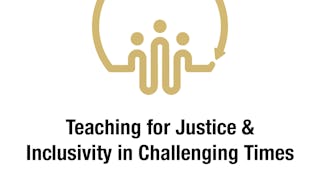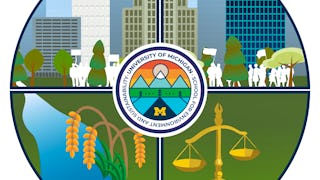"Feminism and Social Justice" is an adaptation of Distinguished Professor Bettina Aptheker's long-running course at UC Santa Cruz. In the course, Professor Aptheker presents a broad definition of feminism that serves to frame three significant events in the history of feminism and social justice: the Empire Zinc strike of 1951, the 1971-1972 trial of Angela Davis, and the #metoo Movement.



(6,378 reviews)
What you'll learn
Explain the working definition of feminism.
Compose a personal definition of feminism.
Discuss the role of protest in feminism and social justice.
Skills you'll gain
Details to know

Add to your LinkedIn profile
4 assignments
See how employees at top companies are mastering in-demand skills

There are 5 modules in this course
Feminism is a movement, a philosophical perspective, and a driver of social change. It has various goals and constituencies, and it continues to be adapted in response to new conditions. In this module, you will be introduced to Dr. Aptheker's working definition of feminism, which she has cultivated and refined over her prolific career. You will also have an opportunity to discuss the meaning and purpose of feminism with your fellow learners.
What's included
2 videos1 reading1 assignment1 discussion prompt
In 1951, zinc miners in southwestern New Mexico went on strike in response to the Empire Zinc Company's discriminatory treatment of Mexican-American workers and their families. After the miners were prevented from protesting by a court order, their wives maintained the picket line. In this module, you will learn about the causes, conditions, and outcomes of the strike. You will also hear the story of the controversial 1954 feature film (called "Salt of the Earth") that documented the struggle of its key figures. The entire film is available in the module.
What's included
2 videos1 assignment1 discussion prompt
In 1970, FBI agents arrested the feminist scholar and activist Angela Davis for her alleged connection to the Soledad Brothers, inmates of Soledad Prison in central California who were accused of killing a guard. At the time of the arrest, President Richard Nixon referred to Davis as a "terrorist." In this module, you will hear Dr. Aptheker's personal experience of Davis' arrest and trial, and you will learn about the extraordinary movement that grew in support of Davis.
What's included
1 video1 assignment1 discussion prompt
The hashtag "metoo" appeared on social media in 2017 in response to a number of high-profile sexual assault allegations in the entertainment industry. It quickly spread to other societal domains and continues to spur discussion and action around the world. In this module, you will learn about the causes and outcomes of the #metoo movement, and its contribution to feminism and social justice. You will also have an opportunity to discuss recent changes resulting from the #metoo movement with your fellow learners.
What's included
1 video1 assignment1 discussion prompt
Dr. Aptheker writes and lectures on a variety of topics. You can find new materials that she produces in this optional module.
What's included
1 video1 reading
Instructor

Offered by
Explore more from History
 Status: Preview
Status: PreviewUniversity of Colorado Boulder
 Status: Free Trial
Status: Free TrialUniversity of Michigan
 Status: Preview
Status: PreviewUniversity of Michigan
 Status: Preview
Status: PreviewStanford University
Why people choose Coursera for their career




Learner reviews
6,378 reviews
- 5 stars
85.86%
- 4 stars
11.81%
- 3 stars
1.69%
- 2 stars
0.29%
- 1 star
0.32%
Showing 3 of 6378
Reviewed on Jul 25, 2020
Incredibly informative and eye-opening about many issues that I thought I knew a bit about but turns out I had no idea about. Particularly the last two weeks on Angela Davis and the MeToo Movement.
Reviewed on Dec 15, 2020
It is an excellent way of learning all the struggles of the feminist movement trough the years and how it is directly related to social justice and the fight for a better and more equal world.
Reviewed on Sep 25, 2021
This Feminism and Social Justice Course was very inspiring.Thank you for the opportunity. Bettina - your lectures are amazing. They are well researched, insightful and a delight to be a part of.

Open new doors with Coursera Plus
Unlimited access to 10,000+ world-class courses, hands-on projects, and job-ready certificate programs - all included in your subscription
Advance your career with an online degree
Earn a degree from world-class universities - 100% online
Join over 3,400 global companies that choose Coursera for Business
Upskill your employees to excel in the digital economy
Frequently asked questions
To access the course materials, assignments and to earn a Certificate, you will need to purchase the Certificate experience when you enroll in a course. You can try a Free Trial instead, or apply for Financial Aid. The course may offer 'Full Course, No Certificate' instead. This option lets you see all course materials, submit required assessments, and get a final grade. This also means that you will not be able to purchase a Certificate experience.
When you purchase a Certificate you get access to all course materials, including graded assignments. Upon completing the course, your electronic Certificate will be added to your Accomplishments page - from there, you can print your Certificate or add it to your LinkedIn profile.
Yes. In select learning programs, you can apply for financial aid or a scholarship if you can’t afford the enrollment fee. If fin aid or scholarship is available for your learning program selection, you’ll find a link to apply on the description page.
More questions
Financial aid available,

